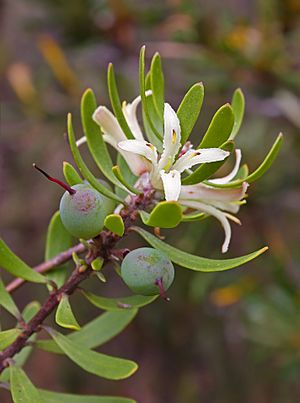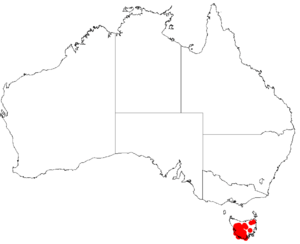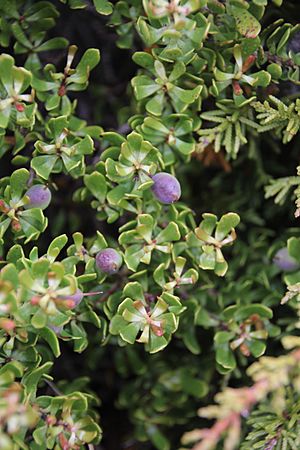Persoonia gunnii facts for kids
Quick facts for kids Persoonia gunnii |
|
|---|---|
 |
|
| In Mount Field National Park | |
| Scientific classification |
|
| Kingdom: | Plantae |
| Clade: | Tracheophytes |
| Clade: | Angiosperms |
| Clade: | Eudicots |
| Order: | Proteales |
| Family: | Proteaceae |
| Genus: | Persoonia |
| Species: |
P. gunnii
|
| Binomial name | |
| Persoonia gunnii |
|
 |
|
| Occurrence data from Australasian Virtual Herbarium | |
| Script error: The function "autoWithCaption" does not exist. | |
| Synonyms | |
|
|
Script error: No such module "Check for conflicting parameters".
Persoonia gunnii, also known as a geebung, is a type of flowering plant. It belongs to the Proteaceae family. This plant is special because it is endemic to Tasmania, which means it grows naturally only there. It is a shrub that stands upright. Its young branches are a bit hairy. The leaves look like a spatula or an egg, being narrower at the bottom. Its flowers are white or cream-colored.
Contents
What Does Persoonia Gunnii Look Like?
Persoonia gunnii is an upright shrub that usually grows between 0.65 and 3 meters tall. That's about as tall as a tall person or a small car! Its young branches are covered with soft, whitish or greyish hairs.
Leaves and Flowers
The leaves of this plant are shaped like a spatula or an egg. They are narrow at the end where they connect to the stem. Each leaf is about 10 to 50 millimeters long and 3 to 10 millimeters wide. They curve upwards and have a straight tip.
The flowers stand upright on small, hairy stems called pedicels. These stems are about 2.5 to 5 millimeters long. The flower parts, called tepals, are white to cream-colored. They are 10 to 13.5 millimeters long and are hairy on the outside. Only the very tip of the tepal is smooth. You can see these flowers blooming from December to May. Sometimes, people might confuse this plant with another similar one called P. muelleri.
How Persoonia Gunnii Got Its Name
The plant Persoonia gunnii was first officially described in 1847. An English botanist named Joseph Dalton Hooker gave it its name. He wrote about it in a science journal called London Journal of Botany. The plant was found by a person named Ronald Campbell Gunn in a place called "May-day Plains."
Similar Plants
Sometimes, you can find plants that look like a mix between P. gunnii and P. muelleri. These mixed plants are found in places like Dove Lake–Cradle Mountain and Adamsons Peak–South Cape in Tasmania. More research is needed to fully understand these mixed types.
Where Persoonia Gunnii Grows
This special geebung plant only grows in Tasmania. You can find it in the southern and western parts of the island. It grows in areas from Black Bluff Range–Lake St Clair to the Derwent River. It prefers higher places, from about 500 to 1300 meters above sea level.
Natural Homes
Persoonia gunnii lives in different types of natural environments. These include:
- Alpine heathland: Open areas with small shrubs at high altitudes.
- Subalpine wet sclerophyll forest: Forests with tough, leathery-leaved plants that can handle dry conditions, but in a wetter, cooler area.
- Rainforest: Dense forests with lots of rain.
It grows in soils that are made of or lie over rocks like dolerite, quartzite, and limestone.
Ecology and Health
Persoonia gunnii is very sensitive to a plant disease called dieback. This means it can get sick and die easily if it catches this disease.
 | Dorothy Vaughan |
 | Charles Henry Turner |
 | Hildrus Poindexter |
 | Henry Cecil McBay |


